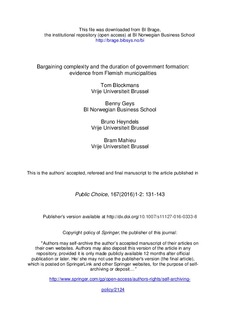| dc.contributor.author | Blockmans, Tom | |
| dc.contributor.author | Geys, Benny | |
| dc.contributor.author | Heyndels, Bruno | |
| dc.contributor.author | Mahieu, Bram | |
| dc.date.accessioned | 2016-05-06T09:45:37Z | |
| dc.date.accessioned | 2016-09-05T08:18:02Z | |
| dc.date.available | 2016-05-06T09:45:37Z | |
| dc.date.available | 2016-09-05T08:18:02Z | |
| dc.date.issued | 2016 | |
| dc.identifier.citation | Public Choice, 167(2016)1-2: 131-143 | nb_NO |
| dc.identifier.issn | 1573-7101 | |
| dc.identifier.issn | 0048-5829 | |
| dc.identifier.uri | http://hdl.handle.net/11250/2404179 | |
| dc.description | This is the authors’ accepted, refereed and final manuscript to the article published | nb_NO |
| dc.description.abstract | Government formation processes have attracted a substantial amount of scholarly attention. Yet, only few scholars try to explain the duration of government formations. This article extends the latter literature by examining the relation between the complexity of the bargaining environment and the duration of government formations at the local government level. We show that increased bargaining complexity - reflected in parties’ ideological similarity, a larger number of potential bargaining partners, and an election result allowing for a larger set of mathematically feasible governments - is associated with longer bargaining delays. | |
| dc.language.iso | eng | nb_NO |
| dc.publisher | Springer | nb_NO |
| dc.title | Bargaining Complexity and the Duration of Government Formation: Evidence from Flemish Municipalities | nb_NO |
| dc.type | Journal article | nb_NO |
| dc.type | Peer reviewed | nb_NO |
| dc.date.updated | 2016-05-06T09:45:37Z | |
| dc.source.journal | Public Choice | nb_NO |
| dc.identifier.doi | http://dx.doi.org/10.1007/s11127-016-0333-8 | |
| dc.identifier.cristin | 1354190 | |
| dc.description.localcode | 1. Forfatterversjon | nb_NO |
